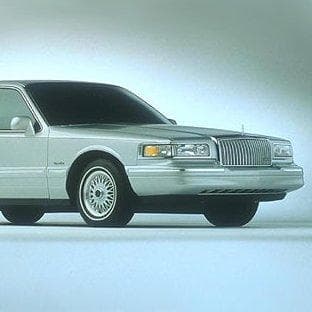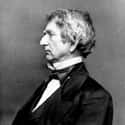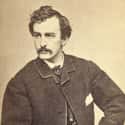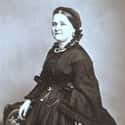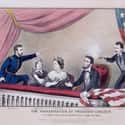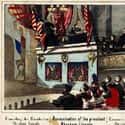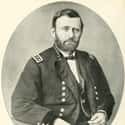-
(#1) The Assassination Was Part Of A Coordinated Attack On Several Other Politicians, Too
The events of April 14, 1865, were supposed to be even more sinister than the assassination of the president. Booth and some of his conspirators had also meant to murder two prominent members of the Lincoln administration that night: Secretary of State William Seward and Vice President Andrew Johnson. The plan was for each assassin - Booth for Lincoln at Ford’s Theater, Lewis Powell for Seward at his home, and George Atzerodt for Johnson at the Pennsylvania House Hotel - to strike at around 10:00 pm.
Atzerodt backed out of the plan. Instead of murdering Johnson, he got drunk at a nearby saloon, checked into his room at the hotel, and passed out on his bed.
Lewis Powell, a former Confederate ranger with John S. Mosby, followed through with the plan. He gained entry to Seward’s own home and charged into the Secretary of State’s bedroom, slashing and pushing his way past two of Seward’s sons, his daughter, and a Union Army guard. He stabbed Seward and fled the scene. Though Seward’s wounds - and those of his sons’ - were serious, they all healed.
-
(#7) There Was A Huge Manhunt For John Wilkes Booth
After the assassination, Booth quickly fled Ford’s Theatre, winding his way through and out of Washington, DC. A multi-day manhunt for Booth began immediately. On April 26, 1865, Booth was finally cornered in a barn at a farm in Virginia. Booth refused to surrender to Union troops, and they burned the barn to the ground.
-
(#6) Mary Todd Lincoln Was Institutionalized After The Assassination
Mary Todd Lincoln was one of the most controversial First Ladies to ever enter the White House. As a Southerner with brothers fighting on the side of the Confederacy, she represented to some all that her husband’s administration was fighting against. Nonetheless, she was a devoted, sharp companion to her husband during the war years. The Lincolns were even holding hands in the theater box the moment John Wilkes Booth shot the president in the head.
After her husband’s death, Mary Todd Lincoln went into deep mourning. This was a woman, after all, who had already buried one of her own children - and would bury another only a few years later. In the late 1860s and 1870s, she suffered from a variety of physical, emotional, and mental ailments, and some even accused her of eccentric behavior. She became paranoid, restless, and lived in constant state of anxiety.
It got to the point where her own son, Robert Lincoln, led an effort to have her legally committed to the Bellevue Place institution outside Chicago in 1875. She campaigned her way out of Bellevue in a matter of months and spent the remainder of her days traveling around Europe and America.
-
(#2) The Assassination Haunted Witnesses For The Rest Of Their Lives
The Lincolns were not alone in their Ford’s Theater box on April 14, 1865. They had invited one of the most promising young couples in Washington to accompany them on a night out at the theater: dashing Union officer Major Henry Rathbone and his fiancée, Clara Harris.
When Booth soundlessly entered the presidential booth and fired a bullet into Lincoln’s head, it was Rathbone who immediately attempted to apprehend the assassin. Booth was prepared, however, and slashed Rathbone’s arm with a knife before fleeing the scene. Though his wound was severe, Rathbone called out, “Stop that man!” to the stunned theater.
Though Rathbone would survive his physical wounds, he continued to blame himself for Lincoln’s assassination - the president, he felt, had died on his watch.
Rathbone and Harris married in 1867 and the couple had three children. Despite their attempts to make a normal life in the aftermath of a traumatic experience, the specter of the Lincoln assassination would haunt them for the rest of their lives. Rathbone’s mental health declined, and he became increasingly paranoid and suspicious.
Things came to a head in Germany, where Rathbone had been placed as a diplomat by President Chester Arthur. On Christmas Eve 1883, Rathbone suffered a fit of madness and approached his children’s room. Clara, fearful for her children’s lives, intervened - Rathbone shot her and then stabbed himself. Though his wife died from the wounds, he survived.
Rathbone lost custody of his children, who were sent back back to the United States, and he was committed to an asylum in Germany, where he lived out the rest of his troubled days.
-
(#8) John Wilkes Booth Broke His Leg While Fleeing The Scene
After firing a bullet into Lincoln’s head and stabbing Henry Rathbone, Booth leapt to the stage of Ford’s Theatre and shouted something at the crowd - it may or may not have been the Latin phrase “Sic semper tyrannus” - before fleeing the theater. In the process of jumping down to the stage, Booth fractured his ankle, causing him some difficulty in moving around.
Booth and an accomplice continued to the plantation of Samuel Mudd, a doctor in Maryland. Mudd’s Confederate sympathies ran deep, and after setting Booth’s broken bone in a splint and sending him on his way, he did not report the assassin to authorities. For this reason, Mudd was arrested and imprisoned until 1869.
-
(#3) Ulysses S. Grant Turned Down Lincoln's Theater Invitation And Escaped Death
The Lincolns had initially invited Civil War hero and future President Ulysses S. Grant and his wife Julia to attend Our American Cousin with them on the night of April 14, 1865. The Grants turned down the invitation, however.
Had the Grants accepted the Lincolns’ invitation, Ulysses Grant surely would have been attacked - if not assassinated - alongside the president that night, and the process of Reconstruction would have looked very different. Indeed, Booth himself had believed that Grant would be with Lincoln in the presidential box.
New Random Displays Display All By Ranking
About This Tool
On April 14, 1865, a man armed with a gun climbed the back stairs of the Ford Theater in Washington, DC. He shot President Abraham Lincoln in the head and changed the course of American history. Abraham Lincoln was the 16th President of the United States and led the great struggle to save the Union and end slavery. Lincoln's assassination did throw the entire country into chaos.
The murderer was a professional actor named John Wex Booth. Many people believe that the assassination of the president must be a conspiracy, and there is an ulterior motive. The random tool introduced 13 facts about Lincoln's assassination that few people know.
Our data comes from Ranker, If you want to participate in the ranking of items displayed on this page, please click here.







